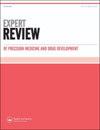B细胞非霍奇金淋巴瘤的靶向免疫治疗
IF 1.2
Q4 PHARMACOLOGY & PHARMACY
Expert Review of Precision Medicine and Drug Development
Pub Date : 2021-09-03
DOI:10.1080/23808993.2021.1967142
引用次数: 0
摘要
非霍奇金淋巴瘤是一种多亚型的疾病,具有许多潜在的靶点。鉴于靶向治疗的异质性和不断发展的前景,在这种疾病状态下结合治疗是复杂的,取决于多种因素。在说明书上或说明书外使用的药物包括:单克隆抗体、抗体-药物偶联物、免疫治疗、细胞治疗和双特异性抗体。在当前的综述中,我们讨论了最近发现的感兴趣的靶点和相应的治疗方法。作者旨在为B细胞非霍奇金淋巴瘤的临床应用提供见解,以及新靶点和这些方法组合的未来方向。现在需要采用多模式治疗非霍奇金淋巴瘤,以早期识别潜在靶点,并将对治疗决策至关重要。由于每种药物都是在复发的难治性环境中定义的,因此这些药物的排序和组合将是至关重要的,特别是在重叠毒性的情况下。在实践中采用不仅取决于疗效,而且取决于是否易于使用、限制副作用和费用。本文章由计算机程序翻译,如有差异,请以英文原文为准。
Targeted immunotherapies to consider for B Cell non-hodgkin lymphoma
ABSTRACT Introduction Non-Hodgkin lymphoma is a disease spectrum of multiple subtypes with many potential targets. Given the heterogeneity and evolving landscape for targeted therapy, incorporation of therapeutics in this disease state is complex and dependent upon multiple factors. Areas covered Agents reviewed for either on- or off-label use include: monoclonal antibodies, antibody-drug conjugates, immunotherapy, cellular therapy, and bi-specific antibodies. In the current review, we discuss the most recently identified targets of interest and corresponding therapies. The authors aim to provide insight on where therapies may be incorporated for clinical utility in B cell non-Hodgkin lymphoma as well as future directions for new targets and combinations of these approaches. Expert opinion A multimodality approach to non-Hodgkin lymphoma will now be needed for early identification of potential targets and will be critical for treatment decisions. As each agent is defined in the relapsed refractory setting, the sequencing and combination of these agents will be critical, particularly with overlapping toxicities. The adoption in practice will depend not only on efficacy but ease of administration, limiting side effects and cost.
求助全文
通过发布文献求助,成功后即可免费获取论文全文。
去求助
来源期刊

Expert Review of Precision Medicine and Drug Development
PHARMACOLOGY & PHARMACY-
CiteScore
2.30
自引率
0.00%
发文量
9
期刊介绍:
Expert Review of Precision Medicine and Drug Development publishes primarily review articles covering the development and clinical application of medicine to be used in a personalized therapy setting; in addition, the journal also publishes original research and commentary-style articles. In an era where medicine is recognizing that a one-size-fits-all approach is not always appropriate, it has become necessary to identify patients responsive to treatments and treat patient populations using a tailored approach. Areas covered include: Development and application of drugs targeted to specific genotypes and populations, as well as advanced diagnostic technologies and significant biomarkers that aid in this. Clinical trials and case studies within personalized therapy and drug development. Screening, prediction and prevention of disease, prediction of adverse events, treatment monitoring, effects of metabolomics and microbiomics on treatment. Secondary population research, genome-wide association studies, disease–gene association studies, personal genome technologies. Ethical and cost–benefit issues, the impact to healthcare and business infrastructure, and regulatory issues.
 求助内容:
求助内容: 应助结果提醒方式:
应助结果提醒方式:


